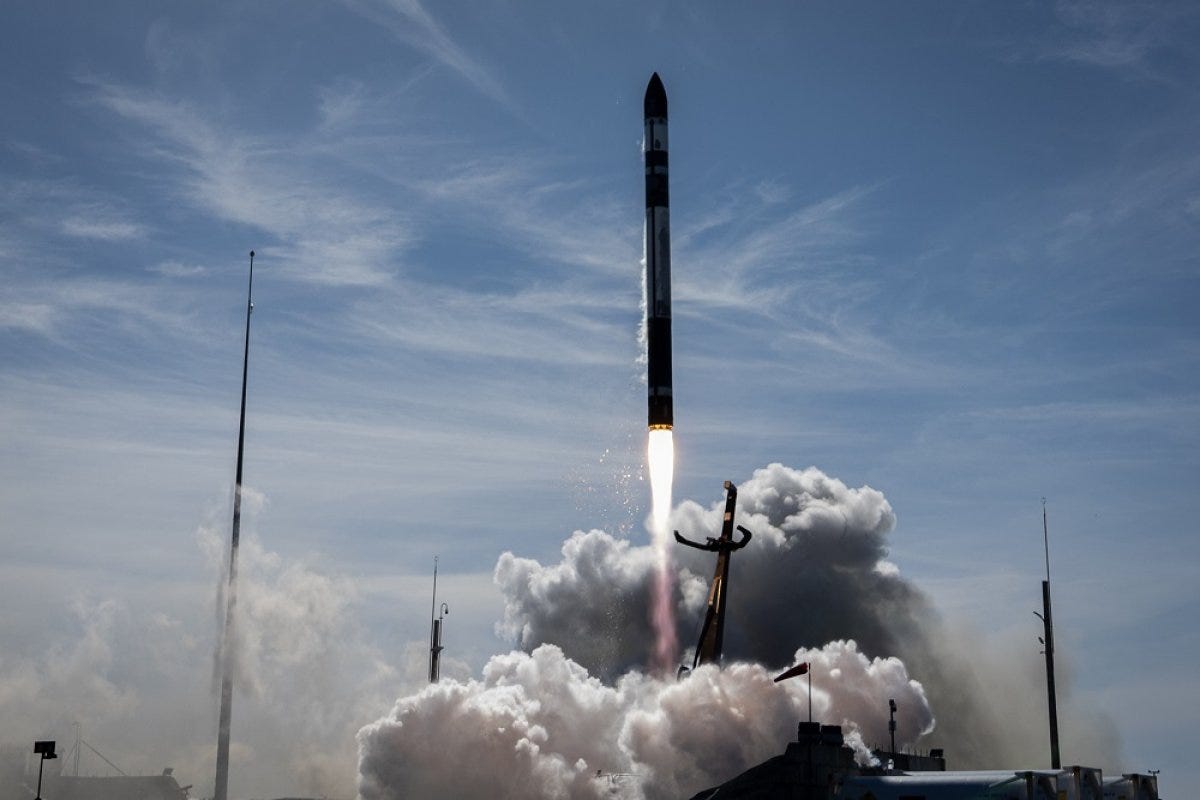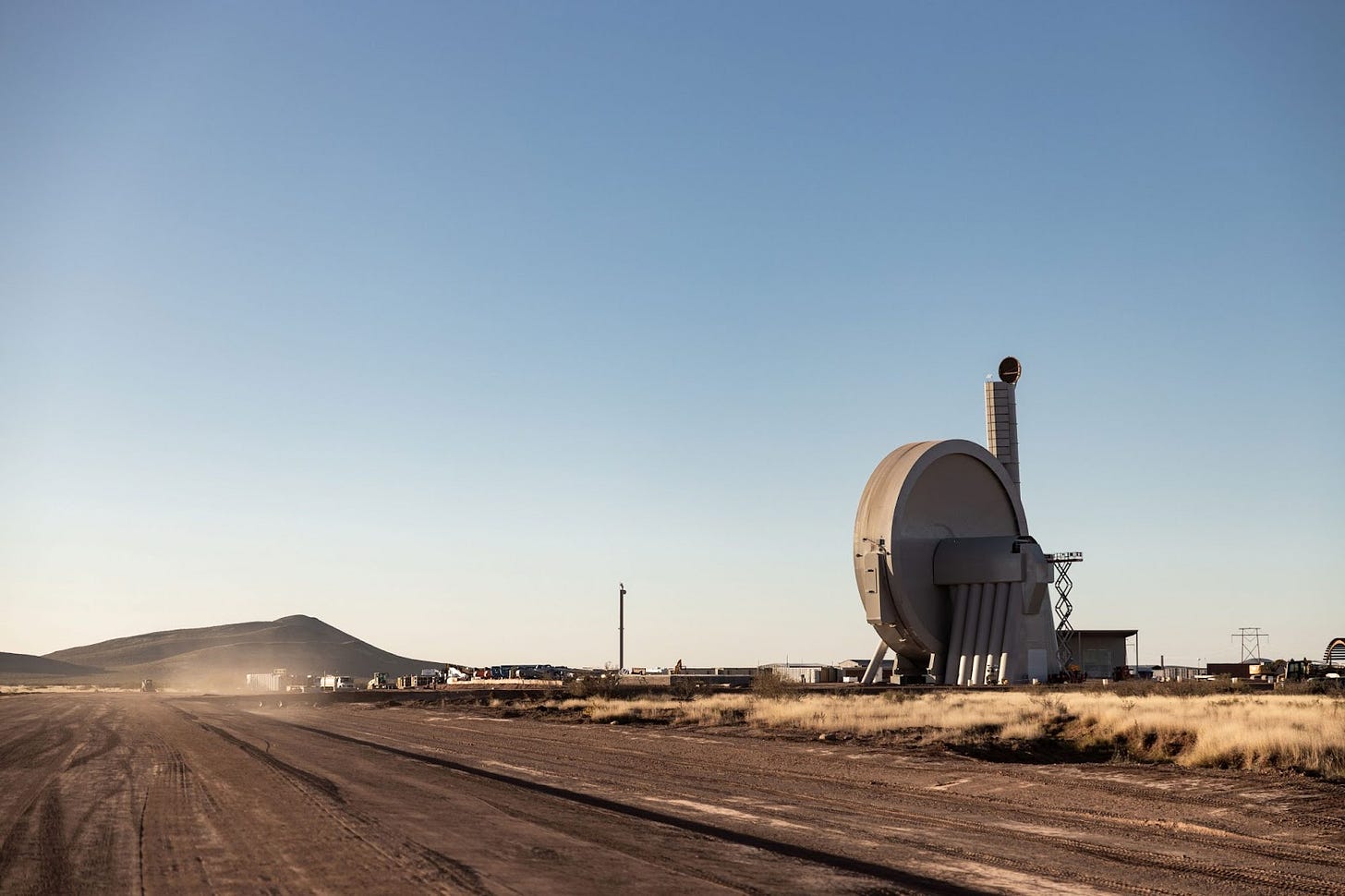Moonshot #39
Rocket Lab summons Electron rockets from both sides of the world, a new telescope emerges in Chile, and one startup is getting closer to throwing satellites into space.

Rocket Lab – At the end of November, Rocket Lab pulled off a historic double launch, sending two Electron rockets to orbit over the course of one day. With one satellite mission for French IoT firm Kinéis taking off from New Zealand’s Māhia Peninsula and a covert hypersonic research mission from Virginia’s Wallops Island, Rocket Lab became the first company to launch from separate hemispheres within 24 hours. The feat gave Rocket Lab’s stock a boost to where it now rests at a $12 billion valuation. But the company’s not settling in for hearth-side eggnog just yet though; the next Electron launch is scheduled for December 17th and is the sixth of sixteen contracted missions for Japanese radar imaging firm Synspective.
Globalstar & Parsons – Like that secret language you made up with your childhood best friend to secretly spill the latest tea, defense contractor Parsons has partnered with Globalstar to offer secure military messaging through specialized waveforms. These undercover waveforms pair well with the “bent-pipe” architecture of Globalstar’s LEO satellite network, a design that, despite its name, is known for being straightforward. In Globalstar’s network, a satellite simply relays signals between Earth and ground stations without performing complex on-board processing, leaving less room for vulnerabilities. Under an exclusive agreement, Parsons’ service with Globalstar will target areas with spectrum competition, or high radio frequency (RF) congestion, ensuring “reliable access in RF-congested environments,” in the words of Parsons’ president of defense and intelligence. So far, the duo has demonstrated the product in North America with plans for global expansion.
This edition of Moonshot is brought to you by the Space Resources program at the Colorado School of Mines.
Neuraspace – Chile is becoming the hot spot for telescopes, and while the latest installment from a Portuguese space traffic management startup may not be as sizable as the aptly-named Extremely Large Telescope, it’s still impressive. Funded by the European Commission, Neuraspace’s second optical Chile-based telescope is designed to track LEO objects, complementing its first telescope located in Portugal. The dual-telescope system enhances tracking precision, and Neuraspace leverages AI to improve collision avoidance and satellite positioning accuracy. Currently, over 400 satellites use Neuraspace’s tracking platform, so apparently the startup is doing something right.

SpinLaunch – As much as we love a punny mission title (we’re looking at you, Rocket Lab), a literal approach is sometimes just as good. Enter SpinLaunch, a California-based startup that specializes in, well, spinning satellites with enough force to launch them into space. Recently, the startup tested its centrifugal launch system in a lab by whipping a smallsat around at a casual 10,000Gs. While the test payload was a basic CubeSat, SpinLaunch did have to apply some “relatively minimal” customizations, including an aluminum upgrade, battery cell rearrangement, and extra glue. You know, it’s the same way you might reinforce a holiday package before surrendering it to the back of a UPS truck – because hopes and prayers aren’t going to save that handmade ceramic mug from the throes (or throws) of peak postal warfare. Fortunately for SpinLaunch, these mods worked, proving that high-performance satellites could survive its slingshot launch method, creating a beacon of hope for cost-effective, eco-friendly space launches.
AST SpaceMobile – On December 9th, AST SpaceMobile's shares rose 16% after the firm announced a 10-year deal with Vodafone, which will effectively provide space-based cellular broadband across 45 additional countries. The deal doesn’t come out of nowhere; it follows significant prior investment in AST SpaceMobile from Vodafone, Google, and AT&T. This funding paves the way for AST to begin deploying its larger Block 2 BlueBird satellites next year, which intend to expand global coverage.
Lockheed Martin & Firefly – Firefly Aerospace’s Alpha rocket will now have a military satellite payload when it launches in 2025. Lockheed Martin will hitch its compact Tactical Satellite (TacSat) – equipped with an infrared sensor and 5G technology – to Firefly’s small-lift vehicle, with the goal of establishing real-time military communication between space assets and ground forces. Finding ways to connect multiple branches of the military seems to be a growing priority for the US defense department, commonly referred to as “all-domain networks.”
This edition of Moonshot is supported by the Open Lunar Foundation. Open Lunar's work sets precedents, creates pathways, and builds projects that enable a peaceful, cooperative lunar presence. Learn more about Open Lunar's work by joining their upcoming events.
Constellr – German startup constellr recently secured a multiyear contract with the German Space Agency (DLR), under which it will provide high-precision thermal imagery to support climate research, agriculture, and urban planning. Constellr will offer 30-meter native resolution with its HiVE constellation, which the company plans to launch in 2025. It’s the hope of constellr’s CEO that this technology will help Germany address “urgent issues” from “global food security to climate action.”
SpaceX – Some say more money equals more problems, but in Elon Musk’s case, it has actually made many problems go away. As it turns out, a quarter of a billion dollars to a presidential campaign can land you a few favors, from the FAA loosening some regulatory reins to more FCC approvals. Needless to say, SpaceX has had a fruitful month, with conditional approval to offer T-Mobile customers Supplemental Coverage from Space (SCS) with Starlink in US dead zones, a $256.6 million contract from NASA to launch the Dragonfly mission to one of Saturn's moons, and a successful test-fire of Starship’s Super Heavy booster in anticipation of the rocket’s seventh demonstration scheduled for January 11th. Riding this forward momentum, SpaceX has now officially petitioned to incorporate its Starbase site in South Texas into its own city. While the company claims that incorporation would support the growth of the Starbase workforce as production accelerates, many locals worry about the environmental implications of a my house, my rules-type of scenario.
Keep reading with a 7-day free trial
Subscribe to Celestial Citizen to keep reading this post and get 7 days of free access to the full post archives.



